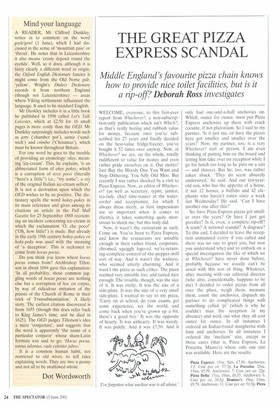Mind your language
A READER, Mr Clifford Dunkley, writes in to comment on the word goylelgowl (1 June), which I had discussed in the sense of 'mountain pass' or 'throat'. He notes that in Leicestershire it also means crusty deposit round the eyelids'. Well, so it does, although it is fairly clearly a different word in origin; the Oxford English Dictionary fancies it might come from the Old Norse gulr. 'yellow'. Wright's Dialect Dictionary records it from northern England (though not Leicestershire) — areas where Viking settlements influenced the language. It used to be standard English.
Mr Dunkley includes it in a little book he published in 1998 called Let's Talk Leicester, which at £2.50 for 16 small pages is more costly than the OED, Mr Dunkley surprisingly includes words such as jeny (chamber pot'), sande (sandwich') and crimbo (Christmas), which must be known throughout Britain.
For one word he goes to the trouble of providing an etymology: okey. meaning `ice-cream'. This, he explains, 'is an abbreviated form of okey pokey, which is a corruption of ecco poco (literally "here's a little") i.e., "try some", a cry of the original Italian ice-cream sellers'. It is not a derivation upon which the OED wishes to be so positive. The dictionary spells the word hokey-pokey in its main reference and gives among its citations an article in the Pall Mall Gazette for 25 September 1888 recounting an incident concerning ice-cream in which the exclamation '0, che poco!' (Oh, how littler) is made. But already in the early 19th century hokey-pokey or hoky-poky was used with the meaning of 'a deception'. This is reckoned to come from hocus pocus.
Do you think you know where hocus pocus comes from? Archbishop Tillotson in about 1694 gave this explanation: 'In all probability, those common juggling words of hocus pocus are nothing else but a corruption of hoc est corpus, by way of ridiculous imitation of the priests of the Church of Rome in their trick of Transubstantiation.' A likely story. The earliest citation discovered is from 1655 (though this does refer back to King James's time, and he died in 1625). The OED judges Tillotson's idea a mere 'conjecture', and suggests that the word is apparently 'the name of a particular conjuror' whose sham-Latin formula was said to go: '1-focus pocus, tontus talontus, vade celenter jubeo.'
It is a common human habit, not restricted to old wives, to tell tales explaining words. They are two a penny and not all to be swallowed whole.
Dot Wordsworth


































































 Previous page
Previous page